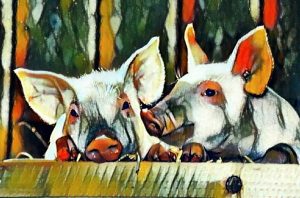From Dallas Doctor’s upcoming collection:
A Storybook From the Future
Kindness & Cruelty
In the 51st-Century
By Dallas Doctor
 “Here ya go Cyndi, have a nice juicy chunk of hamstring,” Omar leered expectantly as he poked at Cyndi with his right-front-fore-hoof.
“Here ya go Cyndi, have a nice juicy chunk of hamstring,” Omar leered expectantly as he poked at Cyndi with his right-front-fore-hoof.
“No thank you,” Cyndi braced herself for the inevitable recriminations, “I’m quite happy with my greens and beans.”
“Mom!” Omar hollered down the length of the feed trough, “Cyndi’s doing it again—she’s acting like she’s better than the rest of us—she’s refusing to eat the broiled human.”
“All I said was ‘no, thank you,’” Cyndi coiled her squiggly tail and shook her snout, knowing full well what was coming.
“You’re so damned annoying,” Omar’s face turned from pink to red, “you’re such a little-missy-do-gooder, always trying to make everyone else feel guilty.”
“I’m doing no such thing,” Cyndi defended herself, “I’m merely choosing kindness over cruelty. Why does that anger you? This is the 51st-century—the robot wars have been over for millennia. We live in a bountiful world with thousands of options. We can choose to be unnecessarily cruel, or we can choose to do as little harm as possible. I simply choose to do less harm; if that makes you feel guilty, you obviously need to do some soul-searching.”
“Soul searching?” Omar exploded, “they‘re only stupid humans. The only reason they even exist is because they’re delicious.”
“They may be delicious, but they’re not stupid,” Cyndi countered, “multiple scientific studies show that, in some ways, humans are as smart as dolphins. The way they’re able to manipulate their hands and fingers is simply amazing; that’s why they’re always such an attraction at the circus. And besides, even if you’re right and humans are stupid, the question isn’t whether they’re as smart as us, or as clever as us, or as good as us; the question is do they suffer? And they do. Biologically, humans are very similar to pigs; that’s why we use them in medical research—even psychology experiments. They have a brain that’s uncannily similar to our own; they have extremely sensitive neurons and a fully-developed central nervous system, just like we do. They feel pain. They experience hunger and longing, and yes, even fear, in very much the same way that you and I do. But most of all, just like you and I, they want to live.”
“Humans don’t feel pain,” Omar laughed, “not the way we do anyway. If they’re so smart, why do they spend their entire lives locked in crates?”
“Because we put them there.”
“We didn’t put them there; the robots did.” Omar imagined he had an excuse for everything.
“But if we didn’t eat them,” Cyndi reasoned, “the robots wouldn’t have any reason to breed more and more of them and treat them so abominably. If it wasn’t for our unnecessary cruelty, there wouldn’t be any reason for the robots to keep them in those awful, unsanitary crates only to fatten them up for us to eat. Did you know that the natural life-span of a human could be up to a-hundred years? We slaughter them at age 14 or 15. They’re just babies—teenagers at the most. And furthermore, did you know that a natural adult human only weighs between 45-to-75 kilos? We fatten them up to over 700-kilos-or-more before their bones have a chance to develop. They simply can’t bear the weight. That’s why they can’t walk, not that they ever get the chance to, spending their entire lives in feeding crates, the way they do…”
“So what?” Omar fell back on his favorite excuse, “plants feel pain and you eat plants, so you’re no better than me.”
“Plants do not have a central nervous system,” Cyndi pointed out the obvious, “there’s no scientific evidence whatsoever that plants experience consciousness. They don’t try to get away when you take a knife to them the way humans do. And besides, if your objection was honest—if you had any genuine concern at all for the feelings of plants—the very first thing you would do would be to stop eating humans, because it takes 25-times more plants to feed a human, just so the human can then feed you, than it would take to simply feed you with the plants in the first place. So if you had the slightest interest in your own argument—if you actually believed in the sentience of plants—which you don’t—you’d be morally obligated to stop eating humans immediately.”
“But we’re meant to eat humans by our biology,” Omar raised his right front hoof to what remained of his vestigial tusk, “check out this canine tooth, Baby. Check Mate! Pigs are meant to be omnivores by evolution.”
“You didn’t pay much attention in school did you?” Cyndi flared her nostrils, “when it comes to evolution, there’s no such thing as ‘meant to be.’ Evolution doesn’t have a plan. Evolution isn’t a design with a goal in mind. Evolution didn’t sit down one day and decide to put long necks on giraffes. Evolution is nothing more than random genetic variations interacting with changing environments. There is no ‘should.’ There’s no moral component to ‘the way things are.’ There is no ‘meant to be.’ If you understood the first thing about evolution, you wouldn’t embarrass yourself with such absurd ’appeal-to-nature’ fallacies.”
“I’m not embarrassed–you are,” Omar mirrored, “nature gave me canines and made me an omnivore, so that’s what I am.”
“I just explained to you why, even if that was true, it has no bearing whatsoever on the obvious fact that today, and every day, you have the opportunity to choose to either be kind or be cruel. And besides, if you were more interested in truth than in being stupid and obnoxious, you’d have to admit that at least in our branch of the Suidae family of artiodactyl mammals, our canine teeth are relatively flat. Yes, our ancient sūs-scrofa ancestors had tusks, but what remains of ours today is largely vestigial. Gorillas and camels have much larger canines than we do and they’re herbivores. There’s even Moschidae—the saber-toothed deer—who eats only leaves, flowers, and grasses. In fact, the world-record holder for canines is the hippopotamus and as you know, hippos are herbivores. So not only have you not checkmated me, your pathetic canines don’t prove anything, and you have no plausible justification whatsoever for your continued exercise in unnecessary cruelty.”
“What if you were stranded on a desert island with a tribe of humans?” Omar reached for his most implausible excuse so far, “I bet then you’d drop all this good-goody kindness crap in a heartbeat and start killing and eating humans; in order to survive, you’d have to.”
“That’s just silly,” Cyndi laughed, “if tribes of humans were living on a desert island, I’d simply eat whatever they’re eating. All the robots ever feed them is corn and grain anyway, so I’d just eat the same plants they eat.”
“But if you don’t eat humans, you’ll never get enough protein,” Omar finally fell back on the biggest myth of all.
“I get all the protein I need from the same place humans get theirs—from plants! Protein is an incredibly bio-available nutrient; it’s plentiful in the plants all around us—vegetables, legumes, nuts, seeds, …”
“Ya know what else has protein?” Omar interrupted, “humans! And I have a right to get my protein from whatever source I want. Why are you always trying to force your values on me? It’s my personal choice to eat humans.”
“Personal choice, by definition, only affects the individual making the choice,” Cyndi raised one hind hoof, “if I kick you in the face, I don’t get to then argue that it’s perfectly okay for me to do it because it was my personal choice to cause you pain. When you eat humans, there are other sentient creatures involved besides yourself. Your personal choice ends as soon as it affects others; it does not, by any stretch of the imagination, extend to you taking the life of an innocent creature who’s done nothing to you and merely wants to live.”
“But you always act like you’re so superior to everyone else, just because you don’t eat humans. I’m getting sick of your superiority complex.”
“Does the fact that you feel morally superior to liars justify lying? Does the fact that you feel morally superior to thieves justify stealing? If you’re going to argue that ‘me being smug’ is causing you to be cruel, you’re saying a whole hell-of-a-lot more about yourself than you are about me.”
[That last comment angered Omar—Cyndi’s personal challenge to his integrity was the last straw—he’d had the feeling all along that he was losing the argument to his sister—so he played his trump card]:
“Humans would eat you if they could.”
“Seriously?” Cyndi almost choked on her greens and beans, “you’re going to base your moral code on ‘what would humans do?’ As you know from your history classes, when humans were in power, they raped and murdered. They enslaved each other. They divided themselves by skin color and by imaginary geographical boundaries. They started wars. They brutally tortured one another. They not only starved each other to death, but came very, very dangerously close to destroying the entire planet in the process. And now, here you are! You come trotting along and say you want to base your ethics on ‘what humans would do?’ That’s the stupidest thing you’ve said so far.”
“I’m just sayin’ that ‘humans would eat you if they could.’”
“Omar, you started this argument by saying I’m acting like I’m better than you because I choose kindness while you choose cruelty. Now you end the argument by adopting the very-same moral code and indifference-to-suffering that humans exhibit? Seriously? You know what, Omar? You’re right. You were right all along. You win the argument—I am, in fact, better than you—that’s obvious now to even the casual observer. The only remaining question is: ‘what are you going to do about it?’”
Thank you for reading. I’d love to hear what you think! (leave a reply below or email me: doc@dockity.com )










Hey Dallas, great to see you are still stoking the ole creative fires. We met up for lunch in NYC a few years back, A burger and 2 beers, Keep yourself healthy, It warms my heart to see your writing.